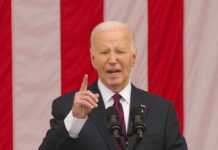Senator Joni Ernst teams up with Trump, Musk, and Ramaswamy to slash federal spending, but challenges loom.
At a Glance
- Sen. Joni Ernst proposes $1 trillion in federal spending cuts
- Ernst chairs new Senate DOGE Caucus for government efficiency
- Trump allies Elon Musk and Vivek Ramaswamy expected to lead DOGE efforts
- Constitutional and legal hurdles may impede executive action on spending
Ernst Spearheads Ambitious Spending Reform
Iowa Republican Senator Joni Ernst is taking bold steps to reform federal spending, proposing ways to cut government expenditure by a whopping $1 trillion. Ernst, known for her “Squeal Awards” highlighting government waste, has delivered her proposals to President-elect Donald Trump and his allies Elon Musk and Vivek Ramaswamy at Mar-a-Lago. The senator’s plan includes ending the manufacture of pennies and nickels, reducing overpayments for Pentagon goods, and consolidating federal office space.
Ernst now chairs the newly created government efficiency caucus in the Senate, dubbed the DOGE Caucus. This group of Republican senators, including Ted Budd, John Cornyn, and Ted Cruz, will advocate for spending cuts after Trump takes office in 2025. The caucus aims to work alongside the proposed Department of Government Efficiency (DOGE), which is expected to be led by Musk and Ramaswamy.
DOGE: A New Approach to Fiscal Policy
The Department of Government Efficiency, while not an official federal department, is set to collaborate with the Trump administration’s Office of Management and Budget on fiscal policy. Musk and Ramaswamy plan to focus on regulatory rescissions, administrative reductions, and cost savings through executive action. This initiative draws parallels to the 1980s Grace Commission but aims to leverage political pressure more effectively to address fiscal issues.
“When faced with proposals to trim the fat from Washington’s budget, members of Congress from both parties act like Goldilocks. It’s too little or too big, always too hard, and never just right. But the real ‘make-believe’ of this fairy tale is that it’s impossible to reduce Washington’s budget without causing pain.” – Joni Ernst Source
The DOGE effort aims to complete its work by July 4, 2026, and is expected to be a key focus of the incoming Trump administration. A significant public outreach component is planned to garner support for the initiative.
Challenges and Criticisms
Despite the ambitious goals, the DOGE initiative faces several challenges. The executive branch, including Trump, is limited in its ability to alter federal spending without Congress’ approval due to the Impoundment Control Act of 1974. Trump previously faced accusations of violating this act by withholding funds for Ukraine, leading to his impeachment in 2019.
“The Pentagon has never passed an audit and is unable to fully account for its budget. By its own estimates, DoD wastes $125 billion on bloated bureaucracy and inefficiency. DoD could save $527 million just by streamlining the duplication and unnecessary overlap within its storage and distribution centers. DoD overpayments are legendary and the department is still overpaying nearly $1 million for spare parts. This includes a nearly 8,000 percent mark-up for a soap dispenser than the shelf price and $1,220 for a coffee cup.” – Joni Ernst Source
Critics point out that Musk and Ramaswamy lack constitutional authority to implement these cuts. Additionally, executive action to cut spending may face legal resistance, potentially reaching the Supreme Court. The initiative could also face challenges under the Administrative Procedures Act.
Looking Ahead
As the DOGE initiative moves forward, it will likely encounter both support and opposition. The Citizens Against Government Waste organization has voiced support for the effort. However, past commissions like Simpson-Bowles had limited impact, and DOGE’s success will depend on its ability to navigate legal and political hurdles. With a focus on regulatory rescissions and administrative reductions, the initiative aims to create sustainable changes in Washington’s financial management, potentially reshaping the landscape of federal spending for years to come.
Sources:
- Ernst pitches DOGE on spending cuts and savings
- Iowa senator pitches Elon Musk on $1 trillion in federal spending cuts
- Does DOGE Need Congress for Massive Budget Cutting?











